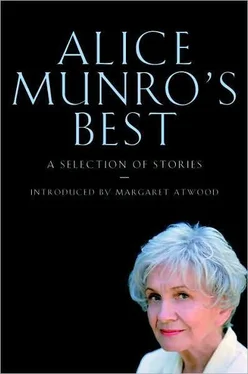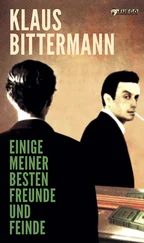Now comes another voice of Flo’s. Enriched, hurt, apologetic, it seems to have been manufactured on the spot. She is sorry to have called him from his work. Would never have done it if Rose was not driving her to distraction. How to distraction? With her back talk and impudence and her terrible tongue. The things Rose has said to Flo are such that if Flo had said them to her mother, she knows her father would have thrashed her into the ground.
Rose tries to butt in, to say this isn’t true.
What isn’t true?
Her father raises a hand, doesn’t look at her, says, “Be quiet.”
When she says it isn’t true, Rose means that she herself didn’t start this, only responded, that she was goaded by Flo, who is now, she believes, telling the grossest sort of lies, twisting everything to suit herself. Rose puts aside her other knowledge that whatever Flo has said or done, whatever she herself has said or done, does not really matter at all. It is the struggle itself that counts, and that can’t be stopped, can never be stopped, short of where it has got to now.
Flo’s knees are dirty, in spite of the pad. The scrub rag is still hanging over Rose’s foot.
Her father wipes his hands, listening to Flo. He takes his time. He is slow at getting into the spirit of things, tired in advance, maybe, on the verge of rejecting the role he has to play. He won’t look at Rose, but at any sound or stirring from Rose, he holds up his hand.
“Well, we don’t need the public in on this, that’s for sure,” Flo says, and she goes to lock the door of the store, putting in the store window the sign that says BACK SOON, a sign Rose made for her with a great deal of fancy curving and shading of letters in black and red crayon. When she comes back she shuts the door to the store, then the door to the stairs, then the door to the woodshed.
Her shoes have left marks on the clean wet part of the floor.
“Oh, I don’t know,” she says now, in a voice worn down from its emotional peak. “I don’t know what to do about her.” She looks down and sees her dirty knees (following Rose’s eyes) and rubs at them viciously with her bare hands, smearing the dirt around.
“She humiliates me,” she says, straightening up. There it is, the explanation. “She humiliates me,” she repeats with satisfaction. “She has no respect.”
“I do not!”
“Quiet, you!” says her father.
“If I hadn’t called your father you’d still be sitting there with that grin on your face! What other way is there to manage you?”
Rose detects in her father some objections to Flo’s rhetoric, some embarrassment and reluctance. She is wrong, and ought to know she is wrong, in thinking that she can count on this. The fact that she knows about it, and he knows she knows, will not make things any better. He is beginning to warm up. He gives her a look. This look is at first cold and challenging. It informs her of his judgment, of the hopelessness of her position. Then it clears, it begins to fill up with something else, the way a spring fills up when you clear the leaves away. It fills with hatred and pleasure. Rose sees that and knows it. Is that just a description of anger, should she see his eyes filling up with anger? No. Hatred is right. Pleasure is right. His face loosens and changes and grows younger, and he holds up his hand this time to silence Flo.
“All right,” he says, meaning that’s enough, more than enough, this part is over, things can proceed. He starts to loosen his belt.
Flo has stopped anyway. She has the same difficulty Rose does, a difficulty in believing that what you know must happen really will happen, that there comes a time when you can’t draw back.
“Oh, I don’t know, don’t be too hard on her.” She is moving around nervously as if she has thoughts of opening some escape route. “Oh, you don’t have to use the belt on her. Do you have to use the belt?”
He doesn’t answer. The belt is coming off, not hastily. It is being grasped at the necessary point. All right you. He is coming over to Rose. He pushes her off the table. His face, like his voice, is quite out of character. He is like a bad actor, who turns a part grotesque. As if he must savor and insist on just what is shameful and terrible about this. That is not to say he is pretending, that he is acting, and does not mean it. He is acting, and he means it. Rose knows that, she knows everything about him.
She has since wondered about murders, and murderers. Does the thing have to be carried through, in the end, partly for the effect, to prove to the audience of one — who won’t be able to report, only register, the lesson — that such a thing can happen, that there is nothing that can’t happen, that the most dreadful antic is justified, feelings can be found to match it?
She tries again looking at the kitchen floor, that clever and comforting geometrical arrangement, instead of looking at him or his belt. How can this go on in front of such daily witnesses — the linoleum, the calendar with the mill and creek and autumn trees, the old accommodating pots and pans?
Hold out your hand!
Those things aren’t going to help her, none of them can rescue her. They turn bland and useless, even unfriendly. Pots can show malice, the patterns of linoleum can leer up at you, treachery is the other side of dailiness.
At the first, or maybe the second, crack of pain, she draws back. She will not accept it. She runs around the room, she tries to get to the doors. Her father blocks her off. Not an ounce of courage or of stoicism in her, it would seem. She runs, she screams, she implores. Her father is after her, cracking the belt at her when he can, then abandoning it and using his hands. Bang over the ear, then bang over the other ear. Back and forth, her head ringing. Bang in the face. Up against the wall and bang in the face again. He shakes her and hits her against the wall, he kicks her legs. She is incoherent, insane, shrieking. Forgive me! Oh please, forgive me!
Flo is shrieking too. Stop, stop!
Not yet. He throws Rose down. Or perhaps she throws herself down. He kicks her legs again. She has given up on words but is letting out a noise, the sort of noise that makes Flo cry, Oh, what if people can hear her? The very last-ditch willing sound of humiliation and defeat it is, for it seems Rose must play her part in this with the same grossness, the same exaggeration, that her father displays, playing his. She plays his victim with a self-indulgence that arouses, and maybe hopes to arouse, his final, sickened contempt.
They will give this anything that is necessary, it seems, they will go to any lengths.
Not quite. He has never managed really to injure her, though there are times, of course, when she prays that he will. He hits her with an open hand, there is some restraint in his kicks.
Now he stops, he is out of breath. He allows Flo to move in, he grabs Rose up and gives her a push in Flo’s direction, making a sound of disgust. Flo retrieves her, opens the stair door, shoves her up the stairs.
“Go on up to your room now! Hurry!”
Rose goes up the stairs, stumbling, letting herself stumble, letting herself fall against the steps. She doesn’t bang her door because a gesture like that could still bring him after her, and anyway, she is weak. She lies on the bed. She can hear through the stovepipe hole Flo snuffling and remonstrating, her father saying angrily that Flo should have kept quiet then, if she did not want Rose punished she should not have recommended it. Flo says she never recommended a hiding like that.
They argue back and forth on this. Flo’s frightened voice is growing stronger, getting its confidence back. By stages, by arguing, they are being drawn back into themselves. Soon it’s only Flo talking; he will not talk anymore. Rose has had to fight down her noisy sobbing, so as to listen to them, and when she loses interest in listening, and wants to sob some more, she finds she can’t work herself up to it. She has passed into a state of calm, in which outrage is perceived as complete and final. In this state events and possibilities take on a lovely simplicity. Choices are mercifully clear. The words that come to mind are not the quibbling, seldom the conditional. “Never” is a word to which the right is suddenly established. She will never speak to them, she will never look at them with anything but loathing, she will never forgive them. She will punish them; she will finish them. Encased in these finalities, and in her bodily pain, she floats in curious comfort, beyond herself, beyond responsibility.
Читать дальше












